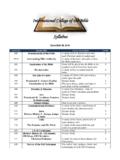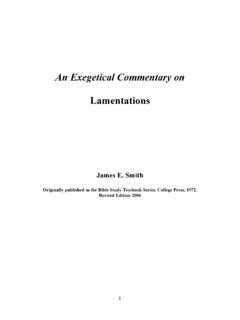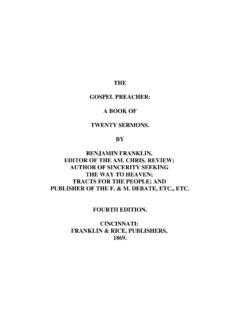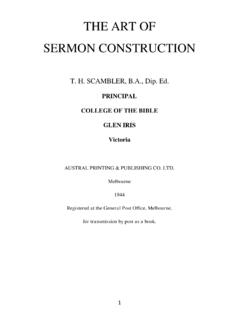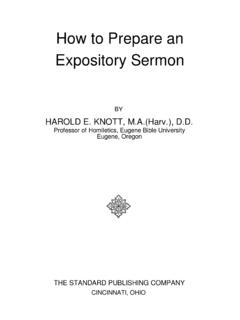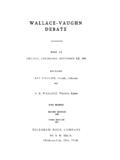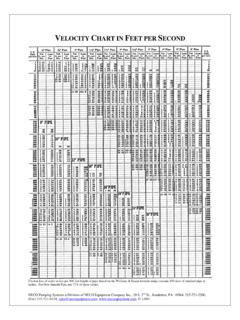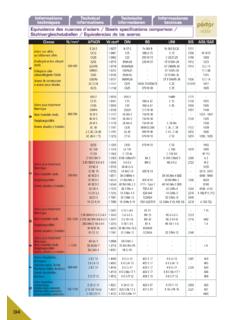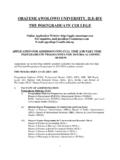Transcription of An Exegetical Commentary on - ICOTB
1 An Exegetical Commentary on EZEKIEL by James E. Smith Originally published as part of the Bible Study Textbook Series by College Press, 1979. Revised Edition 2004 James E. Smith 2 PREFACE The Book of Ezekiel stands in the English Bible fourth among the Major Prophets. It ranks second in actual word count among the prophetic books (39,407 words as compared to Jeremiah s 42,659), and stands third in size in the entire Bible (behind Psalms and Jeremiah). In spite of its size, this book may well be the most neglected of the prophets. Previous surveys have convinced the average Bible student that he cannot possibly understand this material. Ezekiel is regarded as one portion of Scripture with little spiritual value and even less contemporary relevance. Those who do attempt a more serious study of the book often fail to make it past the intricate visionary details of the first chapter.
2 This is most unfortunate. Ezekiel has a vital message for God s people, a message not duplicated elsewhere in the sacred canon. While Ezekiel virtually has been neglected by the church at large, it has come to be the happy hunting ground of cultists, critics and curiosity mongers. The modern negative critics regard Ezekiel as pivotal in their topsy-turvy reconstruction of Old Testament history that views the tripartite priesthood as a scribal concoction from Babylon rather than a divine revelation from Sinai. Ezekiel is cited by self-styled students of prophecy as proof that God s plan for the future includes the modern Zionist movement (Jews returning to Palestine in unbelief), an imminent Russian invasion of Israel, and the reinstitution of the Old Testament animal sacrificial system in a temple shortly to be constructed in Jerusalem. Science fiction buffs have scoured the Book of Ezekiel in search of spaceships and extra-terrestrial beings who pretended to be God.
3 Mormons regard Ezekiel 37:15-23 as the prophetic allusion to the Book of Mormon (stick of Ephraim) being added to the Bible (stick of Judah). If for no other reason, the Book of Ezekiel merits careful study so that the man of God may be able to silence these modern day empty talkers and deceivers who are upsetting so many families today (Titus 1:10-11). The best defense against a thousand and one errors is the truth. There is something more positive to be said in favor of diligent study of Ezekiel. The book is full of profound theology, not the least of which is the doctrine of individual responsibility. God s sovereign grace, his absolute holiness and justice, and his universality are presented here as clearly as in any other portion of Scripture. In spite of difficult details, the theme of ultimate victory for God s people is forcefully developed in this prophecy.
4 These mother lode truths, plus priceless nuggets of revelation too numerous to mention, will make the serious student of this book spiritually wealthy. Let those who will prospect for this treasure not be discouraged by the Exegetical bogs that here and there challenge the resolve as well as the intellect. Ezekiel invites investigation not only because of what he said, but also because of how he said it. The book is fascinating, replete with visions, allegories, and action parables. Not without reason has Ezekiel been dubbed the audio-visual aids prophet. If a picture is worth a thousand words, then Ezekiel must be regarded as artfully verbose. His prophecy is a gallery of word pictures interspersed with mini-stages upon which the prophet performed divinely inspired monodrama. His delightful antics should draw students to his book in these days even as they attracted observers to his door in his day.
5 The Commentary follows the chapter divisions of the book. The translation of the text is that of the author, at least up to ch 40. For the tedious blueprint chs 40-48 the American Standard Version of 1901 has been followed with only minor adaptation. Verse by verse comments follow the translation of the individual units of the text. To condense footnotes as much as possible, a system of abbreviations has been employed. The abbreviations are listed in alphabetical order together with relevant bibliographical information at the end of this volume. James E. Smith 3 Florida Christian College January 2002. INTRODUCTION The study of a prophetic book is rewarding, but not easy. The serious student must be willing to take time to immerse himself in the historical context that gave birth to the book. He must attempt to walk awhile in the sandals of the prophet who wrote the book to understand his motives and manners, his actions and attitudes.
6 He must come to grips, not only with what the book says to and about men, but also with what men have said about the book. All of this takes years of study. But, as the wise one has said, the journey of a thousand miles begins with a single step. This first chapter contains an historical, biographical, and literary introduction to the Book of Ezekiel. STEPPING INTO EZEKIEL'S WORLD Do men make the times, or do the times make the men? That is the age-old question. History is replete with examples of ordinary men catapulted into prominence by circumstances over which they had no control. So it was with Ezekiel. For him the crucial moment came on March 16, 597 On that day King Jehoiachin opened the gates of Jerusalem to the mighty Nebuchadnezzar. The king and some ten thousand of his subjects including Ezekiel were carried away to Babylon. But for that event and the subsequent prophetic call that came to this priest-in-exile, history probably will not have accorded to Ezekiel so much as a footnote.
7 Therefore, to evaluate the historical context of this man of God, one must look backward and then forward from the crucial date March 16, 597 A. Judah Prior to the Deportation of Ezekiel. Ezekiel was born in the eighteenth year of Josiah, 621 Those were bright and promising days for tiny Judah. The shock of seeing their sister kingdom to the north carried away into the far corners of the Assyrian empire a century earlier had now largely disappeared. Young King Josiah had successfully thrown off the oppressive yoke of those same Assyrians. A vigorous religious reformation led by the prophets Zephaniah and Jeremiah, the priest Hilkiah, and the king himself seemed to be correcting the basic moral and religious flaws of the nation. Visible signs of idolatry had been purged from the land, but, as it turned out, not from the hearts of the people. The heroic efforts of that mighty coalition of crown, priest and prophets proved to be in vain.
8 The reformation came to an abrupt halt in 609 That was the year when Josiah met his untimely death as a result of the wounds received in the unfortunate and ill-advised battle of Megiddo. The good king's second son Shallum was elevated to the throne by the people of the land. Shallum assumed the throne name of Jehoahaz. At the end of three months Jehoahaz was deposed by Pharaoh Neco. The Egyptian was still encamped at Riblah about two hundred miles from Jerusalem. Neco placed Eliakim, an older son of Josiah, on the throne of Judah as his vassal. Eliakim ruled under the throne name Jehoiakim. When Neco was defeated by Nebuchadnezzar at Carchemish on the Euphrates (Jer 46:1), Jehoiakim shifted his allegiance to the Babylonian sovereign. Daniel and several other prominent hostages were sent to Babylon at this time (Dan 1:1). Jehoiakim served Nebuchadnezzar for three years (2 Kgs 24:1), probably the years 604-601 When the Babylonian king received a setback on the borders of Egypt, Jehoiakim withheld tribute 4 and declared himself to be independent.
9 To punish the infidelity of his Judean vassal, Nebuchadnezzar marched against Jerusalem. Jehoiakim died a natural death or was assassinated before the arrival of the Chaldean troops. His son, the eighteen-year-old Jehoiachin, had to face the wrath of Nebuchadnezzar s army. After three months or so of siege, Jehoiachin surrendered himself and his capital. The king and ten thousand of his chief people Ezekiel among them were carried away to far-off Babylon. Nebuchadnezzar installed Mattaniah, another son of Josiah and uncle of the most recently deposed king, on the throne of Judah. His name was changed to Zedekiah (2 Kgs 24:10-17). B. Judah After the Deportation of Ezekiel. One will think that the stroke that fell against Jerusalem in 597 will have cured the country of its vice and immorality. Such was not the case.
10 The inhabitants of Judah continued to be a rebellious and impudent people (Ezek 2:4; 3:7). They refused to walk in the statutes of God (Ezek 5:6-7). They had defiled the sanctuary of the Lord with idolatrous paraphernalia (5:11) and practices (ch 8). Pagan high places, altars and images were conspicuous upon every high hill, and under every green tree (Ezek 6:13). In ch 22 of Ezekiel the Lord recites against Judah a catalogue of abominations that will make a pagan people blush idolatry, lewdness, oppression, sacrilege and murder. Such sin permeated all classes of society. Perhaps Ezek 9:9 best summarizes the complete corruption of Jerusalem in its last decade: The iniquity of the house of Israel and Judah is exceeding great and the land is full of blood, and the city full of perverseness. For they say, The Lord has forsaken the earth, and the Lord does not see.
